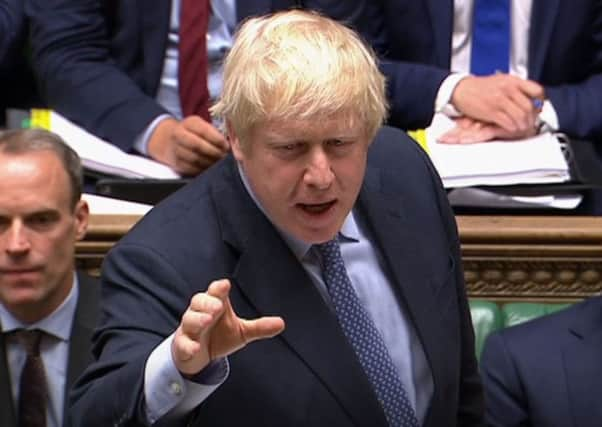Plotting a route out of the political mayhem - Bill Jamieson


The Supreme Court may have mortally wounded him. But the rebel opposition can continue to deny him an election and flay him at their leisure until he agrees to some face-saving changes to the Withdrawal Agreement in Brussels, seeks a Brexit extension, resigns in humiliation or is forced out in a Tory coup. Another one!
Until then, we are gridlocked between a rebel alliance that cannot agree on what it exactly wants, and a government powerless. The denial by the rebel opposition of a general election – this despite all the denunciations raining down on the Prime Minister - brought furious denunciation from a bellowing Attorney General, hurling accusations of duplicity and cowardice. Opposition voices shouted back charges of moral desertion. Seldom has the case for an election been more overwhelming. And seldom has a parliamentary session been angrier and more embittered.
Advertisement
Hide AdAdvertisement
Hide AdThree questions now dominate. What are the longer-term implications of the Supreme Court ruling? What sequence of events can free us from this constitutional car crash and a parliament which, in the astonishing words of the Attorney General, “is a disgrace”? And what if any comfort can be found amid the mayhem and convulsions that have engulfed parliament and the country?
For the moment, calls for respect and acceptance of the Supreme Court’s unanimous judgement ring loud, with the Prime Minister urged to show more acceptance and contrition than he has so far done.
But the longer-term consequences are profound and, as the Attorney General argued in the Commons yesterday, they require time and reflection to be fully examined and understood. After all, it was only two weeks ago the High Court in London concluded that “on well-established and conventional grounds” that the case against prorogation was not justiciable. But if so, how was it that those grounds could be so peremptorily cast aside? What further extensions of legal intervention might now follow? Should there be no limits to the continuing circumspection of executive powers, encroached as they have been in recent years by the EU, the Fixed Term Parliaments Act, and its treaty-making ability? The Supreme Court’s ruling may not be a coup, but it is new law, and in the context of recent developments may be seen as conforming to a constitution-changing mission creep, leading inexorably to a written constitution.
A full descent into chaos as the war over Brexit has taken us, we are not yet at a final climactic endgame. The way ahead may see the following outcomes: the resignation of the Prime Minister or his replacement by an effective coup of backbenchers fearful of the party being driven into a stand-off against the rule of law.
Some minor changes are agreed in Brussels to the thrice-defeated Withdrawal Agreement, but the UK remains inside the Customs Union and the Single Market. The alternative is a departure deadline requested and accepted. The road is then cleared for a general election.
Are matters then resolved? Not at all. In the event of a hung parliament, a minority Tory administration continues to be harried and harassed by Eurosceptic backbenchers. Or a minority rebel alliance, divided as it is by what it wants to achieve, may emerge under a Labour Prime Minister.
There is resolution of sorts as the contours of the battleground have changed. The SNP, energised by the upheld verdict of the highest Scottish court, presses ahead with demands for a second independence referendum. And among Leave-supporters, there is deep and raucous bitterness over the way MPs have acted to thwart the Clean Brexit they thought they had voted for back in 2016. Their battle cry may well be taken from the lips of Greta Thunberg in her electrifying speech this week: “How Dare They!”
The best we can hope for is a lowering of the political temperature. And here some comfort may indeed be taken. Traumatic though recent events have been, with the worst constitutional crisis for more than a hundred years, it has still remained, for now, a raging war of words with no violent eruption in the streets. Demonstrations have been peaceful. No mob fighting has broken out, or streets blocked or cars set on fire.
Advertisement
Hide AdAdvertisement
Hide AdThis is in marked contrast to France where the gilets jeunes have been out in force for 45 weeks, the army deployed, together with a 7,500 strong security force and 137 protesters arrested only last week. In Spain the Guardia Civil was sent into action against supporters of the Catalan referendum, demonstrations broken up by tear gas and truncheons, and leaders arrested or driven into exile. For the record, both countries have written constitutions.